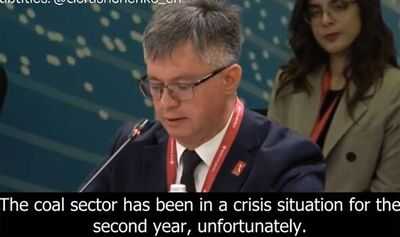
Russia's coal sector, a cornerstone of its energy exports and regional economies, is plunging into what officials describe as its worst crisis in three decades, with losses doubling and dozens of firms on the brink of collapse. Deputy Energy Minister Dmitry Islamov delivered a stark assessment at the Russian Energy Week forum on Thursday, warning that the industry's consolidated losses reached 225 billion rubles (£2.1 billion) in the first seven months of 2025 - twice the total for all of 2024. He forecast full-year shortfalls exceeding 300 billion rubles (£2.8 billion), with accounts payable ballooning to 1.5 trillion rubles (£14 billion).
Islamov said: "The coal sector has been in a crisis situation for the second year, unfortunately." In a video clip from the forum, his voice measured amid a backdrop of economic strain, he detailed how the number of companies in the "red zone" of risk - those halting or slashing production - surged from 30 in April to 53 by July. He added: "Indeed, the industry is struggling right now, but at the same time, it is working very hard," underscoring efforts to sustain output despite mounting debts.
The revelations, shared widely on social media by former Ukrainian interior ministry advisor Anton Gerashchenko, paint a picture of an industry battered by Western sanctions imposed since Moscow's full-scale invasion of Ukraine in 2022.
The European Union's coal embargo forced a pivot to Asian markets, where buyers like China and India demand deep discounts - up to 60% below pre-war levels. Global thermal coal prices, which peaked at around $400 per tonne in late 2022, have cratered to $93 per tonne as of mid-October, driven by a glut from producers including China and Indonesia.
Export prices at Russia's Far Eastern ports hit a low of $69 per tonne in June, the cheapest since 2020, while production costs hover at 6,000-6,500 rubles (£56-£61) per tonne, rendering operations unprofitable for many.
Rail bottlenecks, exacerbated by sanctions on oil tankers clogging tracks, have driven freight costs to 90% of coal prices - up from 50% pre-war.

Major producer Mechel reported a 28% output drop in the first half of 2025 and warned of losses tripling to 300-500 billion rubles for the year. Even giants like SUEK, Russia's largest coal firm, have shuttered or scaled back four mines. Nationwide, 19,000 jobs vanished in the first half alone, with 23 firms already bankrupt and 53 more teetering.
The fallout reverberates through coal-dependent regions, none more so than Kuzbass in Siberia, which produces over half of Russia's 430 million tonnes annually and funds 30 mining towns. The area posted a 70.6 billion-rouble (£647 million) deficit in 2024 and borrowed 36 billion rubles (£330 million) this year to stay afloat.
Coal taxes make up over a third of revenues in places like Khakassia, employing 140,000 directly and powering 12-13% of the nation's electricity.
President Vladimir Putin conceded at a September forum in Kemerovo, the heart of Kuzbass: "Coal producers are having a tough time." An anonymous Russian tycoon told the Financial Times: "The coal sector is in really deep s***," likening the turmoil to the 1990s collapse.
Analysts warn of a "once-in-30-year crisis" dragging down broader growth, already contracting in manufacturing for three months straight.
The sector chips less than 1% off GDP but amplifies vulnerabilities: corporate debt swells, regional budgets bleed, and social unrest looms in mono-industry towns.
The tycoon added: "War is bad for most of the Russian businesses, if not all of them." Ukraine's former deputy economy minister Pavlo Kukhta drew parallels to the crumbling Donbas mines, once subsidised with £750 million annually from Kyiv - assets now plundered by Moscow but yielding little.
In response, Putin signed a May bailout offering tax pauses, loan relief and tariff cuts, with Energy Minister Sergei Tsivilev - a former coal magnate and Putin ally - pushing for 178 billion rubles (£1.7 billion) in 2025 subsidies.
Yet experts like Alexander Titov of Moscow's Institute for Energy and Finance doubt it will stem the tide, as mid-sized firms face bankruptcy and global prices stay bearish through 2027.
Firat Ergene, a coal analyst, noted producers export at losses just to secure dollars and avert layoffs.
As Russia's war machine outlasts early predictions, the coal implosion signals deeper fissures: a mid-year budget deficit of 3.7 trillion rubles (£35 billion), or 2% of GDP, and a depleted National Wealth Fund.
With exports lagging pre-invasion levels despite surges to Asia, the Kremlin eyes occupied Ukrainian coal to plug gaps - a desperate gambit in a sector that once fuelled imperial ambitions. For now, Islamov's plea to "maintain mining" suggests an industry in the grip of serious turbulence.
You may also like

The Arc of the Deal: Donald wants a Napolean-like 'Arc De Trump'- decoding his latest obssession

OctaFX ponzi scam: Kingpin held in Spain, ED seizes Rs 2,385 crore crypto assets

2025 marks second straight year of above-normal rainfall: Experts

Paddington travel chaos LIVE: Train chaos after incident between Reading and London

IRCTC: IRCTC website is down, if you are not getting Tatkal tickets then use this app to book them quickly...







